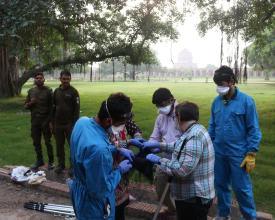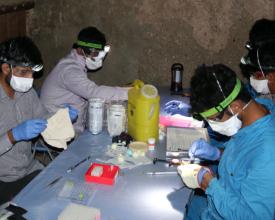Integrating Bat Ecology and Pathogen Surveillance: The Western Asia Bat Research Network

The Western Asia Bat Research Network (WAB-Net) aims to enhance bat conservation and zoonotic disease detection through collaborative research and capacity building-focused trainings with bat biologists, virologists, government authorities, and academics from the region. WAB-Net coordinates research focused on bats, zoonotic diseases, and host-virus dynamics in 7 countries. This proactive approach to pandemic prevention aims to identify both zoonotic viruses before they spill over from bat hosts to humans and the risk factors associated with spillover. Field trainings, including proper PPE usage, bat capture and handling, and cold chain management, promote positive health outcomes for both the humans and bats. All samples are sent to two regional labs where trainings and standardized protocols are implemented, furthering biosafety and scientific advancement in the region. WAB-Net’s “bats for peace” mission promotes strengthened outcomes in both scientific discoveries and constructive political conversations.
Context
Challenges addressed
The region of Western Asia is both geopolitically contentious and an understudied region in terms of the diversity and distribution of bat species and their associated viruses. Despite the critical ecological and economic roles that bats play in maintaining healthy ecosystems around the world, bats are greatly underappreciated especially compared to other more “charismatic” species. WAB-Net addresses multiple social and environmental challenges by finding commonalities and shared interests amongst regional One Health expertise, which has resulted in open communication, building of trust, and fostering collaborative relationships across the region.
Location
Process
Summary of the process
The One Health approach is an inherently collaborative one – by valuing human, animal, and environmental health outcomes and recognizing their interdependence on one another, One Health encourages coordination across disciplines. WAB-Net utilizes a One Health approach and brings together multi-sectoral experts for regional discussions and trainings. By including each sector in their hands-on trainings WAB-Net is able to create well-informed and diverse field teams.
Building Blocks
One Health Proactive Approach
WAB-Net takes a One Health approach in conducting collaborative research and training programs in West Asia, bringing regional expertise that are otherwise siloed in sectors of human, animal, and environmental health. Samples taken from bats across the region are screened for known and novel coronaviruses; human behaviors that could present a spillover risk are identified. WAB-Net serves as the unifying point of virology, bat ecology, and public health initiatives in the region. By coordinating conversations between experts in diverse fields of study, opportunities for novel research questions, more comprehensive agendas, and better-informed policy recommendations are created and implemented.
Enabling factors
EcoHealth Alliance, with experts on global One Health research and policy, serves as WAB-Net’s facilitators and instills a One Health lens on all of its work. Previous experience with bringing together experts from diverse fields and finding commonalities across topics enables them to effectively carry out multi-disciplinary endeavors in a politically volatile region.
Lesson learned
As demonstrated by the COVID-19 global crisis, mitigation efforts after a spillover event occurs often are more costly to both public health and the global economies. A proactive approach to pandemic prevention is made possible through WAB-Net’s work of monitoring both potentially zoonotic viruses in bat populations and human behavior. WAB-Net’s focus on both research objectives and training efforts enhances biosafety throughout all steps of the research process. The collaborative nature of the One Health approach creates more comprehensive and effective recommendations for public health, conservation efforts, and disease management.
Collaborative and Comprehensive Training
WAB-Net brings together stakeholders from diverse sectors and backgrounds to participate in uniquely detailed and thorough capacity-building and hands-on trainings. Field teams consisting of ecologists, government officials representing health and environmental ministries, and students and academic faculty are trained to carry out research while keeping themselves and the bats safe. A bat ecologist will spend several weeks each year in the field teaching the team how to capture, handle, sample, and release bats with biosafety considerations woven throughout each step.
Enabling factors
A bat ecologist familiar with the unique aspects of the taxonomic group and biosafety practices works in collaboration with regional project partners to design standardized field protocols and subsequently implements the field trainings in each country. This uniquely hands-on approach to training field teams ensures the standardization of field protocols across cultures and disciplines in the region.
Lesson learned
WAB-Net serves as the central coordination point for these trainings across the Western Asia region. There is a wide diversity of stakeholders participating, including in their backgrounds and areas of expertise. WAB-Net facilitators learn from the individuals they’re training, creating more culturally relevant lessons. By bringing lessons from one country to another, WAB-Net can enable conversations and collaboration over areas of shared interest, furthering partnerships that would have otherwise been politically difficult to build.
Impacts
Western Asia has been historically overlooked as ecologically important for bat species. The work of WAB-Net is filling in knowledge and awareness gaps for this crossroads location. The standardization of protocols at the two regional laboratories where all diagnostic samples are tested improves efficiency and increases scientists’ ability to repeat processes and compare results. The trainings provided are uniquely in-depth and hands-on, with scientists often spending weeks in-country with field teams demonstrating proper biosafety and nonlethal sampling procedures. This fosters long term relationships and allows for additional ecological data to be collected, advancing overall conservation and scientific goals. The collaborative nature of WAB-Net’s work also plays an essential role in building and maintaining relationships across diverse cultures, religions, and country lines.
Beneficiaries
- Humans in the region, their health and wellbeing
- Bat species across the region, their health and conservation
- Global human population, through pandemic prevention and positively enhanced geopolitical dynamics

